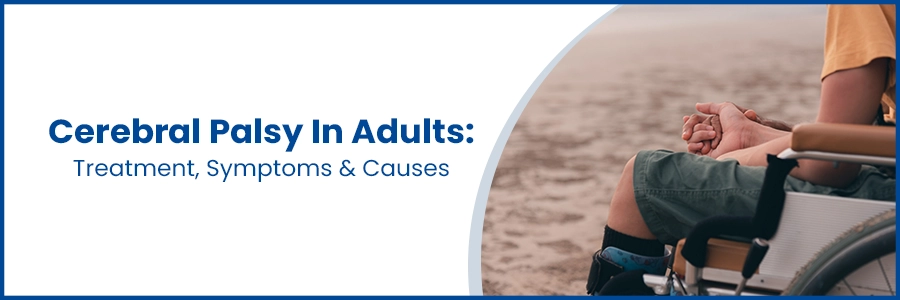Cerebral Palsy In Adults: Treatment, Symptoms & Causes

Cerebral palsy (CP) comprises a collection of enduring neurological disorders that impact one's movement and coordination abilities throughout life. While often associated with childhood, cerebral palsy can also affect adults. This article aims to shed light on cerebral palsy in adults, including its symptoms, treatment options, potential causes. Also we will provide you
Cerebral Palsy in Adults
Cerebral palsy arises from irregularities or harm to the brain that take place before, during, or within the initial years following birth. It affects muscle tone, posture, and movement, making everyday tasks challenging. While the majority of cases are diagnosed during childhood, the effects of cerebral palsy can persist and evolve into adulthood.
Symptoms of Cerebral Palsy in Adults
The signs of cerebral palsy in adults can differ greatly based on the type and seriousness of the condition. Usual symptoms encompass:
-
Muscle Spasticity: Stiff or tight muscles that can affect mobility and flexibility.
- Abnormal Gait: Difficulty walking and maintaining balance.
- Difficulty with Fine Motor Skills: Challenges in performing precise movements with hands and fingers.
- Speech and Communication Issues: Difficulty speaking clearly or comprehensively.
- Chronic Pain: Persistent pain due to muscle stiffness and joint deformities.
- Bladder and Bowel Control Issues: Incontinence and difficulty controlling bowel movements.
- Mental Health Challenges: Depression and anxiety due to the physical limitations and social isolation.
Treatment Options for Cerebral Palsy in Adults
Managing cerebral palsy in adults requires a comprehensive approach tailored to individual needs. Treatment options may include:
- Physical Therapy: Physiotherapy can help improve muscle strength, flexibility, and mobility, enhancing overall quality of life.
- Occupational Therapy: Occupational therapists work on developing practical skills for daily living, like dressing, cooking, and personal hygiene.
- Medications: Medicines can help alleviate muscle spasticity and control pain.
- Orthopedic Interventions: Surgical procedures may be considered to correct joint deformities and improve mobility.
- Assistive Devices: Mobility aids, braces, and communication devices can enhance independence.
- Speech Therapy: For those with communication difficulties, speech therapy can aid in improving language skills.
- Psychological Support: Addressing mental health challenges is crucial, and therapy can help individuals cope with emotional stress.
Causes of Cerebral Palsy in Adults
Cerebral palsy can have various underlying causes. Several factors that may play a role in the development of cerebral palsy are:
- Birth Complications: Lack of oxygen during birth or other birth-related issues.
- Infections during Pregnancy: Infections that affect the developing brain during pregnancy.
- Genetic Factors: Certain genetic conditions or mutations.
- Brain Injuries: Traumatic brain injuries or infections during early childhood.
It's important to note that cerebral palsy is a complex condition, and sometimes the exact cause cannot be pinpointed.
What does a neurologist do for cerebral palsy?
A neurologist is a doctor who knows a lot about brain and nerve problems. They are really helpful for people with cerebral palsy, especially if they go to The Best Neurology Hospital. These doctors can help in different ways:
- Figuring Out the Problem: Neurologists at the best neurology hospitals can find out exactly what kind of cerebral palsy someone has. They do this by asking questions, checking how the body moves, and sometimes doing special tests like pictures of the brain.
- Making a Plan: After knowing what's going on, neurologists work with a team of other experts like physical therapists and speech therapists. Together, they make a plan to help with moving better, talking better, and feeling better.
- Giving Medicine Help: Sometimes, neurologists give medicines to make muscles less stiff or to stop pain. They make sure the medicine is working okay and adjust it if needed.
- Checking Progress: Neurologists keep an eye on how things are going. They see if the plan is helping and if any changes are needed.
- Helping with Information: Neurologists are like guides. They teach people with cerebral palsy and their families about what's happening, how to manage things, and what to expect.
- Using New Ways: If there are new treatments or devices that can help, neurologists can suggest them. They want to make sure that people with cerebral palsy have the best care possible.
How to find the best neurologist for cerebral palsy?
- Ask Your Regular Doctor: Talk to the doctor you usually see. They might know a good neurologist who can help with cerebral palsy.
- Look Online: Search for neurologists who know about cerebral palsy. Check out their profiles, experience, and what other people say about them.
- Hospitals Matter: Check if the neurologist works in a respected hospital. These places often have the best doctors for cerebral palsy.
- Cerebral Palsy Groups: Find groups that help people with cerebral palsy. They might have a list of trusted doctors.
- Check Credentials: Make sure the neurologist has the right certificates for cerebral palsy.
- Experience Helps: Choose a neurologist who has helped many people with cerebral palsy. More experience means better care.
- Meet and Talk: Meet a few neurologists and talk to them. This way, you can see who you like and who understands your needs.
- Listen to Others: People who have seen the neurologist can give you an idea if they are good and helpful.